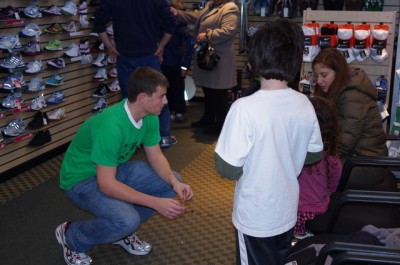Sammie Hardy ’11 and Devin Skolnick ’11
Web Sports Editor and Executive Editor
After 6 hours and 45 minutes of hard academic effort at 70 North Avenue, some Staples students’ workload has only begun.
Many teenagers consider the school day their main responsibility, while others continue on to their after-school jobs.
One current employee of The Driving School of Fairfield works 10- 12 hours each week. From physical labor such as moving boxes to working behind a computer screen, one could assume this job enough to be a full-time responsibility.
However, Connor Austin ’11 takes on such responsibilities, after a hard day of work as a fulltime student.

“I never have time to do my homework at work,” said Austin. He furthered to explain how his job affects his academic responsibilities. “I have to plan when I’m going to do my school work because I don’t have time to do it directly after school,” Austin said.
Like Austin, another student continues to work after the bell rings at the conclusion of the school day. Kelly Ebel ’12 works three jobs throughout the week. As an employee at Clyne Chiropractic & Wellness, a personal assistant, and a nanny, Ebel struggles to balance her schoolwork and job priorities.
“It’s really hard to get school work done. I complete it during my free period and the school day when I can. I usually go to bed around 3 a.m.,” said Ebel. She continued to explain how while babysitting, she sometimes has time to start her homework, but not this is not very common. Although working long hours can be draining for some, there can be numerous benefits to having a job outside of school.
Annika Holbrook ’12, another employee at Clyne Chiropractic & Wellness, commented on her personal benefits of having a career as a teenager.
“Working is good for me. It keeps me focused and on track, rather than going home and watching television,” said Holbrook.
Although she missed the Staples Homecoming football game, she said, “I do miss some things, but I get a lot in return.”
Along with personal development, Holbrook has learned how to cope with her new responsibilities on the job.
Another benefit of working is receiving a paycheck, as personal finances in the real world become a reality as students mature.
Kara Tricarico ’11, a gymnastics instructor at the Westport- Weston YMCA, explained how she saves her money, rather than spending it.
“I put the money in a bank account and save it for college,” said Tricarico.
Likewise, Athletic Shoe Fac tory employee JJ Matthewson ’12 has learned money management from having a job.
“I save 80% of my earnings, and use 20% for whatever I want,” said Matthewson.
Jordan Goldstein ’11, another Athletic Shoe Factory employee, found a job because he, “wanted to make [his] own money for a change.”
Employee at Five Guys Burgers and Fries, Bobby Shea ’11 opened a bank account after he was first hired.
“I learned to save more [money], rather than wasting it,” said Shea. “When you work for your own money, you realize you that you don’t want to throw it away so quickly.”
Although Personal Finance and Accounting are classed offered at Staples, many employed teenagers agree that hands-on experience helps prepare them for their future.
Matthewson suggests that other Staples students should apply for a job because “it teaches meaningful knowledge.”
Through his own job at a sports equipment store, he actively works with customers.
“In the store, I have learned to become more personable. I have developed better social skills, and have been exposed to what work will be like as an adult,” said Matthewson.
Shea agrees. “If you think you can balance long hours on the job and school work, then working is a good decision. But if you feel like you’re forcing yourself to get a job, you probably wont like it.”
While Staples students learn during the school day, and apply their knowledge to after-school responsibilities.
Working long hours may drain time away from students’ abilities to complete homework, but students with jobs have realized the benefits of having an after-school job can be valuable.













































